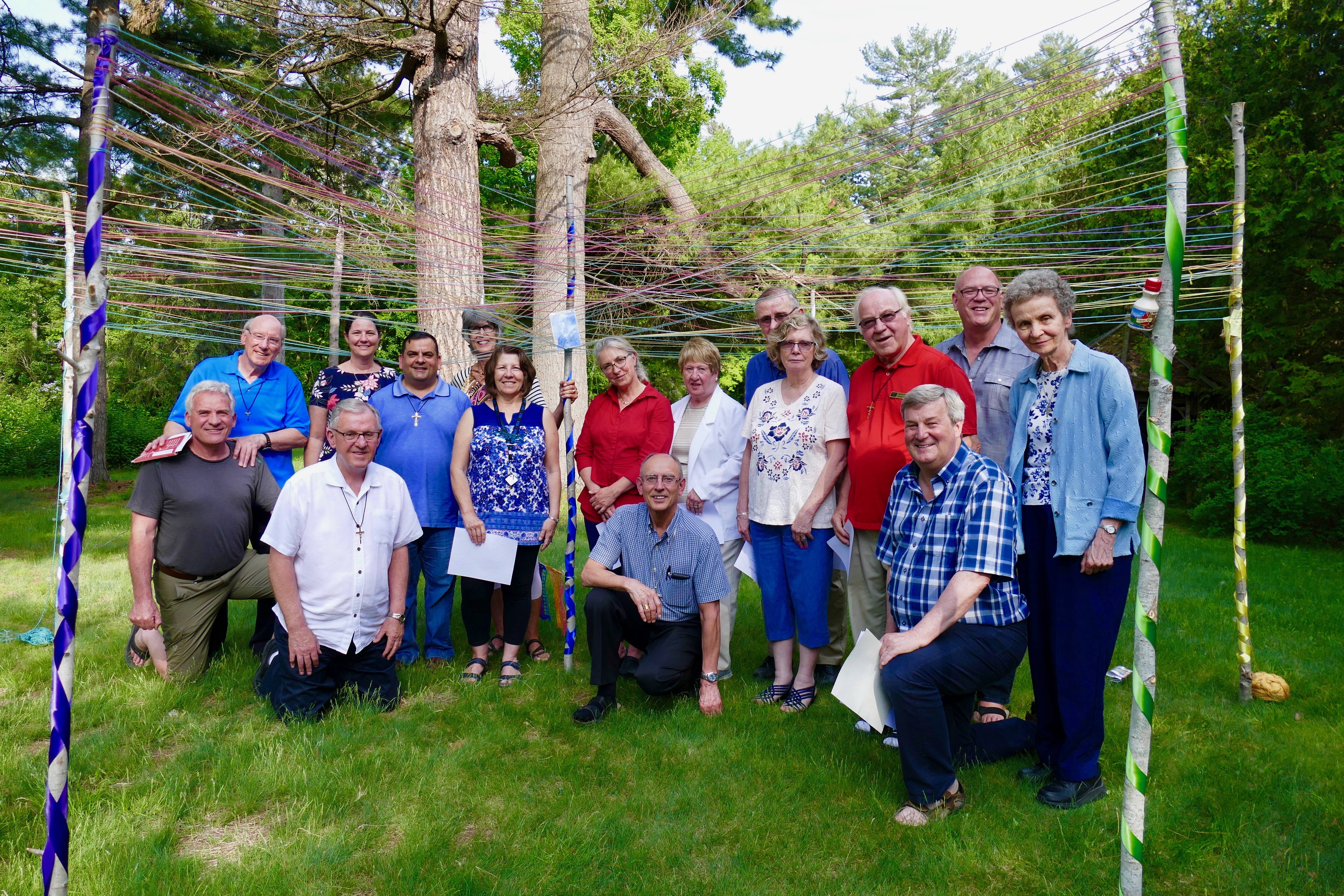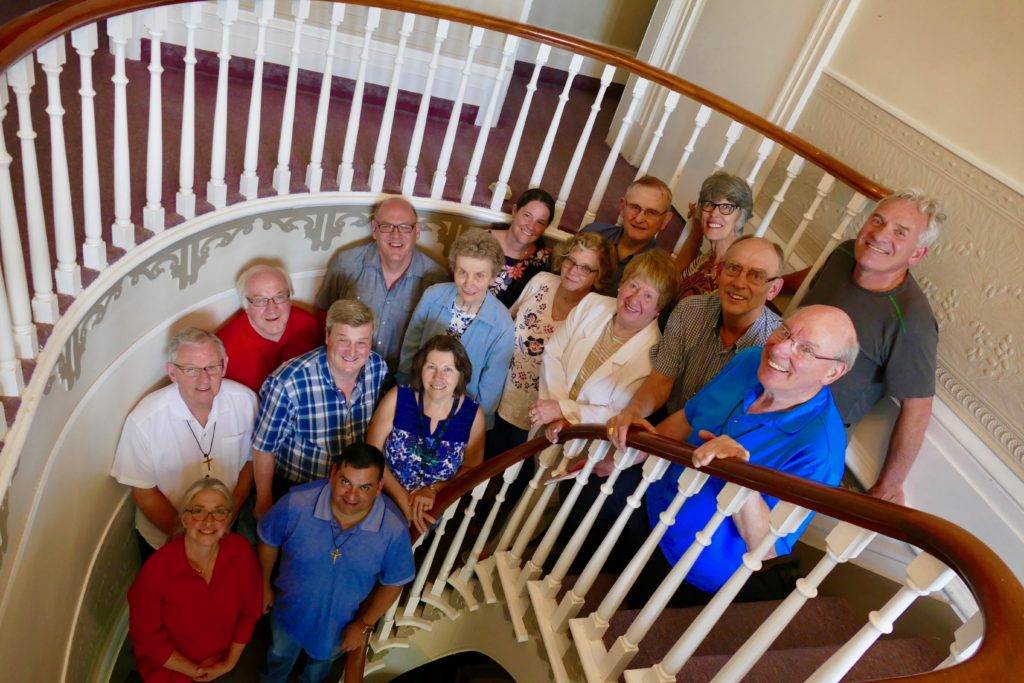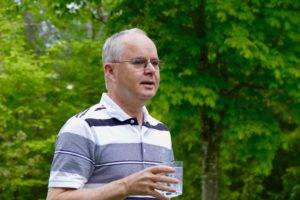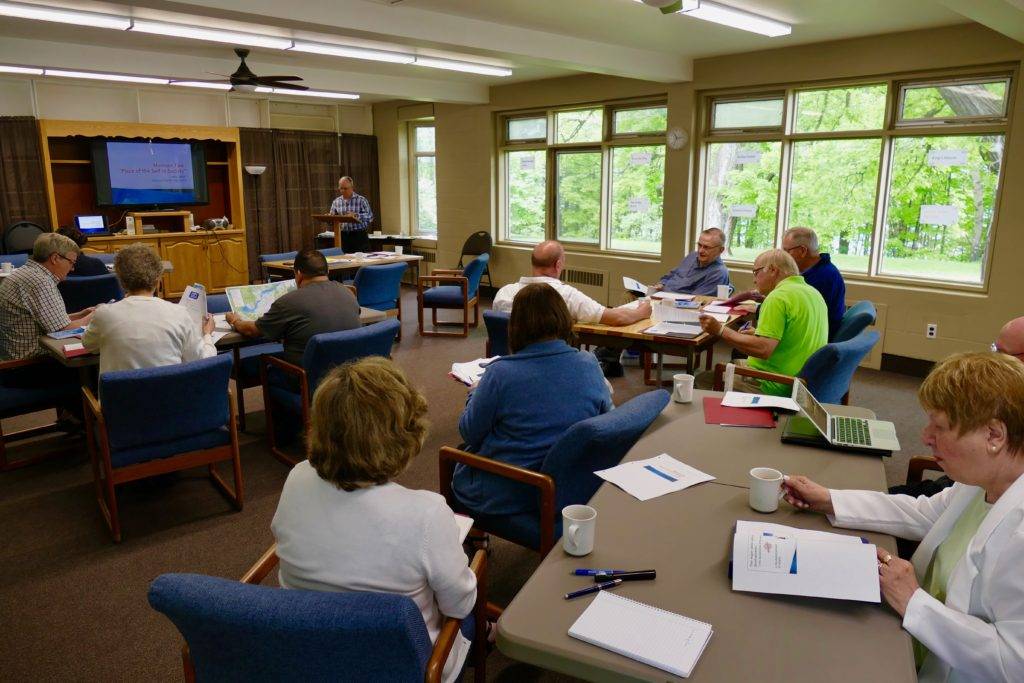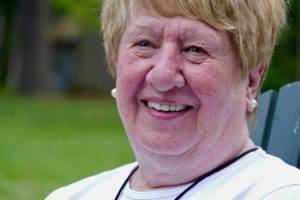Retreat Centres Gather to Reflect on Spirituality of Place
Seven Oblate retreat centres, represented by fifteen people attended this year’s North American Conference of Oblate Retreat and Renewal Centres (NACORRC). The theme was “A Spirituality of Place” presented and facilitated by David Perrin. Jim Bleackley, OMI attended on behalf of OMI Lacombe Canada’s Core Team. Galilee Renewal Centre in Arnprior, ON hosted our three-day gathering with gracious hospitality, wonderful food and accommodations overlooking the spectacular setting along the Ottawa river. Star of the North Retreat Centre, St. Albert, AB, Queen’s House Retreat and Renewal Centre, Saskatoon, SK, Queen of the Apostles, Mississauga, ON from Canada, and Christ the King Retreat and Renewal Centre, Buffalo, MN, King’s House, Belleville, IL, and Oblate Renewal Centre, San Antonio, TX, from the US, all joined together in taking part in three excellent days of presentation, group and retreat centre processing and group sharing through five moments of reflection and creative visioning for the future of Retreat Centres.
In this first of five sessions, David helped us consider how our centres are places for spiritual identity formation, where the mix of all that forms and shapes personal identities, i.e., geography, climate, culture, and politics, all bring forward a personal spirituality of place. “Places act as depositories of human history and, through the memory of that history, they continue to generate meaningful events that construct identity at the communal and personal levels,” he says, and with the expulsion of the Divine from ordinary places, the need for sacred, safe places to reflect, renew and realize the sacredness of all places comes into being. He went on to say, “Place has an impact on how Jesus shaped and shared his message. Place is an interactive category in shaping identity” and retreat centres offer “meaning making through identity formation in place.”
In this way, Oblate retreat centres are distinct from and, uniquely compliment parish life. They provide safe and sacred space for spiritual identity formation and growth for any people from any background: religious, atheist, Christian or other. Safe places for spiritual growth, distinct from Temple, Mosque or Church help people to freely form and shape their particular spiritual identity. A centre with an implicitly Oblate Catholic Christian identity becomes a place for countless people to form their faith and spiritual identity each in their splendid particularity.
Our second moment of the conference entitled “Place of the Self in Society”, looked at the development through history from a highly religious society in the earliest centuries to the secularization and disenchantment with religion in society. Here, Perrin noted a chapter from Charles Taylor’s critical work on “Secularization and the Great Malaise” where the retreat of religion, belief and practice in public life formed and shaped “a change in the conditions of belief.” The transcendent horizon is absent while “inflated images of being special, unique are only potentially realized and self-delusion lives devoid of a higher purpose.” Or, as Ron Rolheiser considers, “narcissism, pragmatism and unbridled restlessness” become the shape and form of the de-spiritualized identity. Therein grows a loss of capacity for contemplation. The “Non-Contemplative” personality emerges needing “empirical validation of experience, with reality non-referential of the sacred, belief in no higher power, symbolic elements of life seen as naïve, “will of God’ a strange concept and an overall lack of wonder and mystery”. The paradigm shift is from a religious society to one where “coexistence among equals is based on mutual benefit, constraint of social groupings is diminished, and where worldview is ‘dispirited”.
How are we to find middle, neutral ground to obtain our bearings, and grow a spiritual identity? Perrin further notes Taylor’s Middle Ground, wherein a new place for God can be had, or Reginald Bibby’s Ambivalent Middle where the search for the sacred includes “innovation and experimentation, new forms of religious/spiritual expression, old forms revived and adapted, and ‘a la carte’ religion”. This is the messy, middle ground, where retreat centres are liminal places for forming identities in ways like Sally McFague’s Ecological Spirituality to “overcome oppressive dualism and hierarchies, encourage change and novelty, promote justice and ethics of care and develop the capacity to endure the absence of God and uncertainties in the spiritual life.”
The third moment of our time together was focused on describing the mimetic quality of our centers. What do each of our centers uniquely represent? Mimesis simply means “mirroring” or representing. After a presentation on the philosophical debate between Aristotle and Plato’s views on the usefulness of art as mimesis, David invited each of our centers to intentionally construct the mimetic qualities of our Centres. “In the naming”, he said “we are in the making.” As retreat centre staffs, we had time to consider and to name our mimetic quality in a few words. Each centre then explained their choice for words and posted these on a board for display.
Our final two moments were to consider how our centres reflected both “desert” and “city” experience for spiritual formation. Finally, each centre was invited to write a six-word story “in the spirit of a memoir” that would describe our retreat centre, use metaphor to describe how our places engaged seekers who come to our centres and the aspirations for the future of our centres. This seemingly impossible exercise produced wonderful, awe-inspiring six-word stories to carry forward to our centres and to vision into the future.
In the course of our days together, we had occasion to celebrate the life and ministry of Anne Hales who has worked tirelessly with the Oblates of Assumption Province at Queen of the Apostles Retreat Centre in Mississauga, ON, for over 40 years. Anne gave us a flavorful overview of how she found her path of ministry, being intially called and invited by Fr. Mike Smith, OMI. Her roles expanded through the years and she used the full measure of her gifts to nourish school groups, women and adults on retreats and with the ACTS program. After her sharing, we were all invited to reflect on how we came to serve in retreat ministry with the Oblates.
Prayer, daily Eucharist, a ritual to invite conversations between centres, along with a day outing to Ottawa to see the sights, completed the balance of our conference. Reflecting on “Spirituality of Place” reminded us of the value of our Oblate Retreat Centres as “privileged places of evangelization” (Fr. Jetté), where hospitality welcomes people where they are at on the spiritual journey and hopefully mirrors a way through to fullness of life. Our few days together also gave us pause to celebrate where we are and intentionally reflect where we’d like to grow in service to community, the church, and ultimately to many more people seeking hope and meaning for their lives.
By Lucie Leduc, Provincial Associate & Director of Star of the North Retreat Centre


